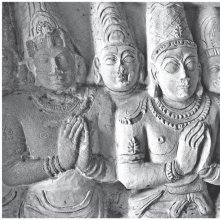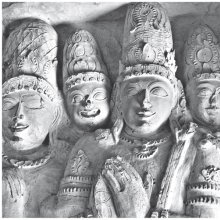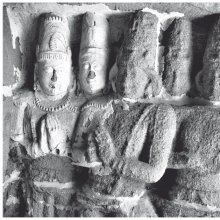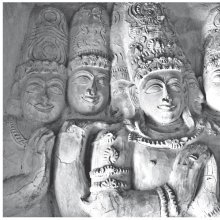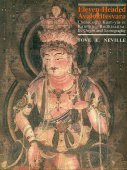Rang, Raṅg: 8 definitions
Introduction:
Rang means something in Hinduism, Sanskrit, Hindi. If you want to know the exact meaning, history, etymology or English translation of this term then check out the descriptions on this page. Add your comment or reference to a book if you want to contribute to this summary article.
Images (photo gallery)
Languages of India and abroad
Sanskrit dictionary
Source: DDSA: The practical Sanskrit-English dictionaryRaṅg (रङ्ग्).—1 P. (raṅgati) To go, move.
Source: Cologne Digital Sanskrit Dictionaries: Benfey Sanskrit-English DictionaryRaṅg (रङ्ग्).—riṅg RiṄG, i. 1, [Parasmaipada.] To go, to move.
Source: Cologne Digital Sanskrit Dictionaries: Cappeller Sanskrit-English DictionaryRaṅg (रङ्ग्).—raṅgati move hither and thither, rock.
Source: Cologne Digital Sanskrit Dictionaries: Monier-Williams Sanskrit-English DictionaryRaṅg (रङ्ग्):—[class] 1. [Parasmaipada] ([Dhātupāṭha v, 36]) raṅgati, to move to and fro, rock, [Nalacampū or damayantīkathā]
Source: DDSA: Paia-sadda-mahannavo; a comprehensive Prakrit Hindi dictionary (S)Raṅg (रङ्ग्) in the Sanskrit language is related to the Prakrit word: Raṃga.
[Sanskrit to German]
Sanskrit, also spelled संस्कृतम् (saṃskṛtam), is an ancient language of India commonly seen as the grandmother of the Indo-European language family (even English!). Closely allied with Prakrit and Pali, Sanskrit is more exhaustive in both grammar and terms and has the most extensive collection of literature in the world, greatly surpassing its sister-languages Greek and Latin.
Hindi dictionary
Source: DDSA: A practical Hindi-English dictionaryRang in Hindi refers in English to:—(nm) colour; dye; complexion; paint; a suit, trump (in playing cards); grandeur; beauty; ways; influence; whim; kind, category; gaiety; stage; -[ameja] a painter; one who applies colour; -[ameji] painting; colouring; ~[karma] stagecraft; ~[karmi] a stage-man; (one) applying colour; ~[kara] a painter; -[kshetra] a stage; —[griha] a theatrical pavilion, theatre; -[dhamga] ways, manners, demeanour, conduct; ~[dara] coloured; ~[pitha] a theatre; -[biramga] variegated, multi-coloured; -[bhavana] see ~[mahala; bhumi] theatre, stage; arena; ~[mamca] stage; ~[mamdapa] theatre, theatrical pavilion; ~[mahala] the apartment meant for amorous sport, private apartment; -[mela] matching of colours; -[ramgila] variegated, colourful; ~[rali] see [ramgareli; rupa] physical appearance, looks; ~[vardhaka] mordant; ~[vata] an amphitheatre; ~[shala] theatrum, theatre; ~[saja] a painter; ~[saji] painting; ~[sthapaka] a mordant; ~[hina] colourless; —[ana] to assume fullness; to assume true colours; to become colourful; to achieve youthful grace and grandeur; to enjoy thoroughly; —[ukhadana] to lose influence; to lose charm; to fall into adversity; the tide of enjoyment to ebb away; —[udana/utarana] to fade; to lose facial lustre; to lose wits; to turn pale/pallid; —[khulana] colour/complexion to be brightened up; to become clearer; —[khelana/dalana/phemkana] to drench with coloured water (during the Holi festival); —[cadhana] to be in high spirits; to be coloured; to be influenced; to be colourfully youthful; to be in full bloom; —[cuna/tapakana] to be in the fullest bloom; youthful charm to be manifest all over; youth to attain its fullness and charm; —[chodana] to give up colour, to be decoloured; —[jamana] to have attained influential position, to establish supremacy; to be held in esteem; to be in full swing (as [mahaphila mem ramga jamana]); to be enjoying thoroughly; —[jamana] to hold under a spell/sway, to attain influential position; to establish one’s supremacy; to impart fullness; —[dekhana] to watch the ways of; —[na jamana] to fall flat, not to win applause; —[nikharana] the colour to be brightened up; to become fairer; one’s essential self to emerge; —[pakadana] to acquire/attain fullness; to be in full bloom; to acquire the colour/ways of; —[para ana] to assume true colours; to be in full swing to attain fullness, to be in full bloom; —[phika padana/hona] to fade out; to lose brightness/lustre; one’s influence to be on the wane; —[badalana] to change colours; to undergo a radical change; to assume a different stance; —[bigadana] one’s influence to be on the wane, one’s spell to be broken; adversity to set in; —[bharana] to fill in colours; to impart fullness/completeness (to a picture); —[mem] in good spirits, in full/high feather; —[mem dhalana] to be moulded according to some influence, to be under somebody’s sway; —[mem bhamga] a skeleton at the feast, a fly in the ointment; —[mem bhamga karana] to mar a happy occasion, a melancholic to appear in a gay gathering; —[mem bhamga karane vala] a wet blanket, a spoilsport; a kill-joy; —[mem ramgana] to mould after one’s image; to exercise overwhelming influence; —[racana] to go gay; to celebrate with gay abandon; —[lana] to have an effect; to manifest the real effect; to present/emerge in true colours..—rang (रंग) is alternatively transliterated as Raṃga.
...
See also (Relevant definitions)
Starts with (+321): Ramgabhumike, Ramgagara, Ramgagite, Ramgakusala, Ramgalisu, Ramgamahalu, Ramgamalar, Ramgamamtapa, Ramgambogu, Ramgaparikara, Ramgapuje, Ramgare, Ramgasajjike, Ramgasamagri, Ramgashale, Ramgashilpi, Ramgasiddhate, Ramgatalimu, Ramgatamtra, Ramgavale.
Ends with (+154): Akar sulur kerang, Akleng parang, Amarang, Angapratrang, Antrang, Apamarang, Arang, Awarang, Bab-o-rang, Baba-rang, Babarang, Baberang, Babrang, Badrang, Bahirang, Baibirang, Baibrang, Bajrang, Baobarang, Barang.
Full-text (+66): Ranga, Mahonnati, Tritiyin, Mukhyata, Janmi-rang-rang, Jammi-rang-rang, Rangamalli, Rang-barat, Rang-tang-kwang, Ka-rang-tang-kwang, Dieng soh rang, Shay-rang, Ya rang nok, Fa-rang, Baba-rang, Rang he, T'rang, Yaa rang nok, Ta-rang-tang-kwang, Rang-ngi.
Relevant text
Search found 44 books and stories containing Rang, Raṅg, Raang; (plurals include: Rangs, Raṅgs, Raangs). You can also click to the full overview containing English textual excerpts. Below are direct links for the most relevant articles:
Mūlamadhyamakakārikā (by Nāgārjuna)
Chapter 15 - Investigation of Essences
Chapter 22 - Investigation of Tathagata
Bodhisattvacharyavatara (by Andreas Kretschmar)
Text Section 213 < [Khenpo Chöga’s Oral Explanations]
Text Section 307 < [Khenpo Chöga’s Oral Explanations]
Text section 187 < [Khenpo Chöga’s Oral Explanations]
The Great Chariot (by Longchenpa)
Part 3e.1 - Nirmanakaya: The brief teaching < [B. The explanation of the kayas and wisdoms]
Blue Annals (deb-ther sngon-po) (by George N. Roerich)
Chapter 6 - First incarnation series (xi): rang byung kun mkhyen chos kyi rgyal po < [Book 8 - The famous Dakpo Kagyü (traditions)]
Chapter 1 - Shri System (iii): Nying phug pa < [Book 14 - Great Compassion Cycle]
Chapter 6 - The first incarnation series (Karmapa) < [Book 8 - The famous Dakpo Kagyü (traditions)]
Guhyagarbha Tantra (with Commentary) (by Gyurme Dorje)
Text 15.28 (Commentary) < [Chapter 15 (Text and Commentary)]
Text 15.25 (Commentary) < [Chapter 15 (Text and Commentary)]
Text 15.27 (Commentary) < [Chapter 15 (Text and Commentary)]
Tibet (Myth, Religion and History) (by Tsewang Gyalpo Arya)
2. The Three Traditional Theories < [Chapter 3 - Nyatri Tsanpo; The First King of Tibet]
6. Nyatri Tsanpo as descendant of Theurang [Tib: The'u rang] < [Chapter 3 - Nyatri Tsanpo; The First King of Tibet]
5. Thonmi Sambhota; the Time and the Place < [Chapter 5 - Tibetan Language and Writing System]
Related products
